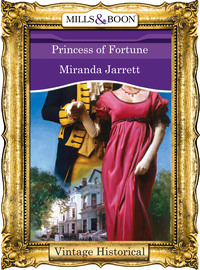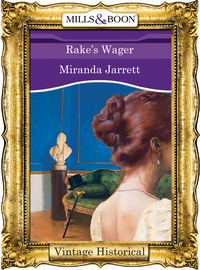
Полная версия
The Silver Lord
“Mr. Winslow isn’t here,” she answered, so quickly that he was sure she’d been anticipating the question. “He is—he is away at present.”
“Is he indeed?” George was surprised; he knew the agent had been quite specific about his visit since there’d been so few inquiries about the house.
“Indeed, he is.” She flushed as she noticed his gaze shift to her clasped hands, looking for a wedding ring. “Mr. Winslow is my father, not my husband. I can show you the house every bit as well as he.”
He held his hat before him and bowed, just from the waist, and smiled. She deserved that from him. It wasn’t any of his business whether she had a husband or not. Still, for some reason he was glad she wasn’t married to the ne’er-do-well caretaker, but instead merely burdened with the rascal as her father. “Then show away, Miss Winslow. Show away!”
She didn’t smile in return the way he’d hoped, though the flush remained in her cheeks. “You will not like the house.”
He frowned. “Why are you so certain?”
“Because none of you fine London-folk do.”
“Then it is a good thing I am neither from London, nor what you would deem ‘fine’, being a sailor,” he said, wondering why the devil she seemed so determined to warn him away. “You are not quite as knowledgeable as you believe yourself to be, Miss Winslow.”
“Nor am I quite so ignorant as it pleases you to think,” she said. “Even here in Kent, we have heard of the ‘Silver Lord’. Rich as the king himself, they say you are now, and all from plundering that Spanish treasure ship.”
“‘They’ do not always tell the truth, Miss Winslow.” He should have realized his new fame would have preceded him, even to this remote place, and he doubted he’d ever grow accustomed to that hideous soubriquet that his own brother Brant had concocted. But unlike the greedy admiration and interest his good fortune had brought him in London, this woman seemed disdainful, her gaze patently unimpressed as it swept over his uniform.
“Now shall you show me this house, Miss Winslow,” he asked, “or will you leave me to find my own way?”
He couldn’t tell if she sighed with resignation, or irritation, or simply took a deep breath as she turned towards the first room to the left of the hall.
“The oldest part of Feversham Hall was built in 1445 by Sir William Everhart,” she began, lecturing like a governess with her hands folded before her at her waist. “It was supposed to be called Rose Hall, but the Feversham stuck instead because of the fevers and miasmas that rose each summer from the marshes. They say from fear of fevers, Sir William wouldn’t come down from London until he’d been assured of a killing frost.”
“I can understand the old gentleman’s reluctance,” said George as he followed. “I saw what yellow-jack could do to an entire fleet in Jamaica. I wonder that you don’t worry for your own health, Miss Winslow, living so near to the marshes.”
She paused, staring at him as if he’d asked the most foolish question in the world. “I have always lived near the marshes, and I cannot imagine living anywhere else. Besides, it’s only the outsiders that are stricken with the fevers. We folk that live here always are never touched.”
“So if I were to make this my home,” he asked, “then I should never be touched either?”
“Shifting your home to here would make no difference at all,” she answered firmly. “Not even you can have whatever you wish to buy. At Feversham, you would always—always—be an outsider. Now here, this is the front parlor.”
He frowned, tapping his thumbs along the brim of the hat in his hands. He was accustomed to being obeyed by his crewmen and most everyone else he encountered in his life, and he certainly hadn’t been corrected with such directness by a woman since he’d left the nursery.
The same woman who’d just turned her back to him—to him!—and was now walking briskly away as if he were nothing more than that lowly stable-boy.
“Miss Winslow,” he said, his voice automatically marshalling the authority of the Nimble’s quarterdeck. “Miss Winslow. Have you forgotten that I have come here solely to inspect this house for the purpose of making it my own?”
Slowly she turned, her hands still clasped before her, and gazed at him over her shoulder with unsettling evenness, almost as if they were equals.
“I have forgotten neither your purpose nor mine, no,” she said, her head tipped to one side so the pale light slipped across the curve of her cheek. “You are here to see Feversham, just as I am here to show it.”
He let out his breath slowly, unaware until that moment that he’d been holding it. “I am glad you have recalled your duty, Miss Winslow.”
“Yes, Captain My Lord.” She turned her head another fraction to the left as she dipped a quick curtsey of unconvincing contrition. “I recall everything. My duty, and my miserable low station before my betters. I shall not forget either again, Captain My Lord.”
Before he could reply she’d swept into the next room, tugging aside the heavy curtains at the windows. Weak sunlight, swirling with motes, filtered through the tiny, diamond-shaped panes and drifted over furniture shrouded in white cloths like so many ghosts. Miss Winslow didn’t glide through the parlor like London ladies, but went striding across the patterned floor so purposefully that her black skirts flurried and fluttered around her ankles in white-thread stockings.
But the skirts and the ankles were the least of it. Why in blazes did he have the distinct impression that by agreeing with him as she had, she’d still somehow bested him?
“There are sixteen chairs made of the same Weald oak to match the panelling,” she announced, twitching aside a dropcloth to display the tall-backed armchair beneath it. “It is considered most rare to have the complete set like this.”
Most rare the chairs might be, but George was in no humor to appreciate it. “That chair is a right ugly piece of work, Miss Winslow,” he said testily, “whether it has fifteen brothers or a hundred, and I’d wager it’s barbarously uncomfortable in the bargain.”
“That is your judgment, My Lord.” A fresh spark of challenge lit Miss Winslow’s gray eyes as she flipped the cover back over the offending chair. “The last master, Mr. Trelawney, appreciated the old ways in his home.”
“Or perhaps,” said George, “Mr. Trelawney was simply too tightfisted to make the necessary renovations to bring the old ways up to snuff with the new.”
“And what if he was, Captain My Lord, or what if he wasn’t?” she demanded tartly. “It’s been four years since Mr. Trelawney died, and nothing has been changed in that time. I told you the house wouldn’t suit you.”
George raised a single brow. “I haven’t said that it didn’t, have I?”
“You’ve as much as said it, saying everything’s gone fusty and shabby,” she said, her voice warming. “The other Trelawneys up north aren’t about to keep up with London fashions and improvements when what’s here will serve well enough. Times are hard, what with the wars and all, and the Trelawneys aren’t the sort to go tossing good coins after bad for no reason.”
“But what a wonderfully fine thing their carelessness is for me, Miss Winslow,” countered George, “especially if the shabbiness of the ‘old ways’ lowers Feversham’s asking price.”
She dipped her chin, letting the words simmer and stew between them. Too late she’d realized he’d been teasing her, and clearly the knowledge hadn’t made her happy with him, or herself, either.
“Through these doors lies the dining room,” she said curtly, turning with an abrupt squeak of her heel to lead the way.
George followed, keeping his little smile to himself. He’d won this particular skirmish handily, and he suspected there’d be more to come before they were done. Clearly Miss Winslow hated losing just as much as he did—which was making this tour a great deal more interesting than the old-fashioned furniture and creaking steps.
Their truce lasted through the tour of the dining room, the drawing room, and another dark little parlor pretending to be a library, though the shelves appeared to hold not books, but a mouldering collection of badly preserved stuffed gamebirds. The same uneasy peace held between them as they went downstairs and through the empty servants’ hall, past the laundry and the dairy and the echoing catacombs of the pantry, scullery, and kitchen, where George decided there was nothing more desultory than a kitchen bereft of the bullying chatter of a cook and the savory fragrances of roasting and baking, or sadder to see than a cold, clean-swept hearth with a row of empty spits above it.
How in blazes did Miss Winslow live in the middle of this? Surely she couldn’t be spending night and day alone among these shrouded chairs and mouldering walls, not and keep that straight defiance in her back and the sharp spark in her eyes. Surely there must be some other small, snug cottage on the land where she and her old father lived, some other place that was home.
But if that were so, then why did she still have so much pride in the old hall, shabby as it was? And why, when he had the power to restore it, did she seem so resentful of such a possibility? Why was she so intent on chasing him away?
And why, really, did he care?
“This is the mistress’s bedchamber,” she was saying as she threw open the shutters of the next-to-last room upstairs. “It has not been used in a long time, Mr. Trelawney being a bachelor-gentleman.”
“But doubtless at least one visiting queen or another has slept here,” said George, gazing at the enormous canopy bed, the heavily carved posts and the faded white and gold brocade hangings still maintaining a rare, regal grandeur. “Isn’t that always the case with the grand beds in these old houses?”
“No,” she said quickly. “Not here, not at Feversham. No lady’s ever slept in that bed that hadn’t a wedded right to it.”
Unable to resist such an opening, he patted the bed’s faded coverlet. “You’ve not been tempted to try it yourself, Miss Winslow? Not once, for a lark, to see how the mistress slumbered?”
Fiercely she shook her head, even as she blushed. Ah, he thought, so she had tried the bed, no matter how severe and proper she aspired to be. What woman wouldn’t, really, when tempted with a bedstead fit for a queen?
Or fit for a smoke-eyed woman with a queen’s own bearing….
“You have not asked of the roof, My Lord,” she said hurriedly, wishing so clearly to move from the topic of the bed that he almost—almost—regretted twitting her about it. “Most of you Londoners ask after that.”
He glanced up towards the ceiling, where the white plaster was stained yellow from obvious water damage. “I assume that there is one?”
“Of course,” she said. “It is made of tiles, to replace the old thatch.”
“And does it leak, Miss Winslow, this tiled roof?”
She looked upward, too, following his gaze. “Rain is a part of our life here, Captain My Lord. Raindrops and sea-spray—why, we scarce notice them, nor the marks that they leave.”
He smiled, knowing inevitably what would come next. “But the Londoners notice?”
“Oh, yes,” she said with undeniable triumph in her voice, and for the first time she smiled in return, quick and determined, in a way that seemed to link them together for that instant. “They do. Here is the last room for you to see, My Lord, the master’s chamber. You shall understand for yourself why it is the most perfect room in the entire house.”
His own smile lingered as he followed her, thinking of how that grin of hers was already as close to perfection as anything he’d see today. He’d tolerate a good winter’s worth of water-marked plaster to be able to see her look at him like that again.
But as soon as she pulled back the heavy velvet curtains, he forgot everything else but the view that rolled away before him. Here the old-fashioned diamond panes had been replaced with newer casements, freeing the landscape. The overgrown remnants of a garden huddled close to the house, then a band of wind-stunted oaks and evergreens that ran to a ragged edge of sandy land, and then—then lay the restless, shimmering silver of the sea, the horizon softened on a gray day like this so the waves and sky blended into one. What he would see from these windows would never be the same twice, just like the sea itself, and just like the sea, he’d always be drawn irresistibly back to it.
“Mark what I say, Captain My Lord,” said Miss Winslow swiftly, realizing too late the cost of sharing perfection. “There is so much wrong with Feversham that you cannot see for yourself, not in so short a time! Every chimney needs repointing, and every fireplace smokes. I cannot count the panes missing from the windows, the lead in the mullions having gone so brittle. The last cook left over how the bake-ovens are crumbling to dust from the inside, and there’s so many bats living in the attic that they’d come down into the servants’ quarters, too, making the maidservants all give notice from fright.”
He was only half listening, because none of it mattered. He would make whatever was wrong into right, wouldn’t he? There’d be no better way to spend his Spanish silver than this. He would have the curtains taken down from these windows, and he would never replace them. He would want to wake to this, his own private square of sea, and he would want to fall asleep to it each night as well.
“Shall I call your carriage, Captain My Lord?” the gray-eyed woman beside him was asking. “You should begin your journey now, before it grows later. Your driver will not wish to take his horses on our roads after dark.”
“Thank you, Miss Winslow,” he said gently. He could hardly fault her if she wished to keep such a magical place as this to herself, could he? But if he hadn’t come, then someone else would, and at least he would be sure to give her and her worthless old father a handsome parting settlement when he let them go. “Tell the driver I shall be ready in half an hour’s time.”
“You will leave, then, Captain My Lord?” she asked, the relief in her eyes strangely sad. “You will be gone from Feversham?”
He nodded, wishing for her sake that the truth didn’t feel like deceit. He would leave, but he meant to return, and then he wouldn’t leave again until he’d new orders from his admiral. He would always come back to Feversham because, like every wandering sailor, at last he’d found his home. He’d prepared for the worst, and been granted better than he’d ever dreamed.
He’d found perfection.
Chapter Three
Fan stood on the bench and gazed out over the score of expectant faces turned up towards her, her hands clasped before her to hide any trembling. The candlelight from the lanterns flickered with the drafts that found their way in through the barn’s timbers, and the men of the Company were waiting so quietly that she could hear the horses at their hay, rustling and nickering in their stalls behind her.
“I know there’s talk at the tavern in town,” she began, “and I’m not the kind to pretend otherwise. The hard truth is this—that a Londoner came to look at Feversham with an eye towards buying it.”
She let the muttered oaths and exclamations settle before she continued. “But this fine gentleman found the house old and inconvenient, with much lacking,” she said, adding a bit of purposeful scorn to her voice for extra emphasis, “and I do not expect him to bother with us again.”
“You didn’t show him this barn, did you, mistress?” called one man to the raucous delight of his friends. “He wouldn’t’ve found much lacking there if’n you had.”
“Nay, Tom, not the barn, nor the privies, either,” she answered dryly. “I kept our secrets to ourselves, where they belong. But I did take care not to show him the house in the best of lights, just to be sure. The sight of old Master Trelawney’s moldy stuffed pigeons seemed enough to send him racing back to London, his driver whipping those hired horses for all he was worth.”
They laughed again, as much from relief as from amusement, and pushed and shoved at each other, as if to prove that way that they hadn’t been worried, not at all. But Fan knew she wasn’t entirely free of the questions, not as long as Bob Forbert stood in the front of the crowd, chewing on the inside of his mouth and shifting nervously from one scrawny leg to the other.
“The boy that watered the coachman’s horses, mistress,” he said, his voice squeaking as he strived to make himself heard. “The boy said the man weren’t no regular Londoner, but a fancy lord and a king’s officer, a Navy man in a coat all glittering with gold lace. Do that be true, mistress? That some bleeding gold-lace officer was here poking his long nose around our affairs?”
Instantly the laughter and raillery stopped, and all the faces swung back towards Fan for an answer.
“Yes,” she said slowly, carefully. “He was Captain Lord George Claremont of His Majesty’s Navy, but all that interested him was the house.”
Smuggling took money from the king’s pockets, and in turn the king took catching smugglers most seriously. Officers like Captain Lord Claremont were sworn to capture smugglers as enemies of the crown, especially now with the country at peace with France. Such an officer could destroy her life as well, if he learned of her role in the Company, and there wasn’t a man in the barn who wasn’t thinking the same.
How simple it sounded that way, how clean and uncomplicated, when in fact the captain’s visit was still twisting away at her, as sharp as a new-honed knife. When she’d received the letter from the Trelawneys’ agent in London, she’d imagined the captain to be the model of Navy cruelty, with a twisted, squinting face as weather-beaten as a cliff to reflect the wickedness of his personality.
But an aristocratic captain: what could possibly make for a worse combination? To be sure, she’d next to no experience with arrogant noblemen, though she’d heard enough tales of how they were all riddled with the pox and fat from too much drink and wickedness. And considering this one’s reputation as a famously daredevil frigate captain—the agent had made quite a point of that—he’d likely also have lost an arm or leg in battle, or be hideously seamed with scars. She had pictured the visitor like this in alarming detail, steeling herself for the unpleasant task of showing him the house.
But what she had never imagined was the reality of Captain Lord Claremont who had presented himself on Feversham’s doorstep.
She had, quite simply, never in her life met such a gentleman, let alone found one standing on the doorstep before her. He was appallingly handsome, tall and broad-shouldered and lean, and the dark blue coat and white breeches of his uniform were so closely fitted that she’d no more need at all for her imagination.
It wasn’t just that he had all his limbs, unlike the Captain Claremont she’d been picturing in her mind. This Captain Claremont stood before her with an assurance that was new to Fan, a kind of unquestionable confidence that came from inside the man, not from any tailor’s needle. She could see it in his eyes, his smile, even the way his dark hair waved back from his forehead. She’d known her share of brave men, but their bravery had come from muscle and force, while this one—this one would have the same muscle and force, true enough, but it would be his intelligence and his conviction that he would win that would always give him the advantage.
And God help her, he already had it over her. He had begun by treating her like the lowliest parlor maid, and she had responded as was fitting for the housekeeper of Feversham: dignified and aloof, and justly proud of her position and the old house. He’d respected that, or so she’d thought at first.
But somehow things had shifted between them while she’d shown him the house. He’d challenged her, dared her, badgered her, until she’d done it all back to him, and not only in defense, either. She’d enjoyed testing herself against such a clever man: that was the horrible truth of it. She’d enjoyed the banter, and she’d enjoyed being with him. By the time they’d reached the bedchambers, he’d been out-and-out flirting with her, and, wretched creature that she was, she could only smile and blush like some simpleminded maid.
Her only solace came from knowing Captain Claremont had left Feversham the same day he’d come, and wouldn’t return. He’d made that clear enough, hadn’t he? She’d made a shameful fool of herself once, but at least she’d be spared doing it again. And if she let his handsome, smiling face haunt her dreams, then that would be her penance.
That, and the questions and doubts of the men before her.
“But why Feversham, mistress?” called Will Hood from the back, and others rumbled along with him in a chorus of uncertainty. “There’s scores o’ other grand houses for the likes o’ him. Why’d he come here if he’d no reason?”
“He wished a house by the sea,” answered Fan, raising her voice, praying she sounded more sure of herself than she felt. “That is what the Trelawneys’ agent in London wrote to me. He saw a drawing of Feversham, and was much taken with it. But he found the real house much lacking and inconvenient, and left disappointed, determined to find another.”
She was unwisely repeating herself, and she saw the uneasy glances passing back and forth.
“Captain Lord Claremont saw nothing to make him wish to return,” she continued, “nor anything of our affairs here. None of this barn, or your ponies, or the boats near the stream.”
“This Captain Lord Claremont, was he the same captain what made all the fuss last year?” asked Hood. “The one what stole all that silver from that dago treasure-ship? Was he your gentleman here?”
“He’s not my gentleman,” said Fan quickly, but no one else noticed the distinction, or cared.
“Likely this Claremont’s friends with the old bloody Duke o’ Richmond, too, may his bones rot in the blackest corner of Hell,” said Forbert darkly. “All them nobles are kin, aren’t they? I say this one’s come to see us broke and strung up for the gulls to pick apart, like they did to those poor blokes on Rook’s Hill near Chichester.”
“And I say you’re daft, Forbert, making no more sense than a braying jackass,” said Hood, wiping his nose with a red-spotted handkerchief. He was a sensible man, an old friend of her father’s, one she trusted and one the others listened to as well. It was also whispered in awe that Hood was strong enough to row single-handedly across the Channel to France, which doubtless added extra weight to his opinions. “Those black days o’ Richmond were your grandfather’s time, not ours.”
“But who’s to say they won’t come back?” demanded Forbert peevishly. “Who’s to say they’re not here now?”
“Because they’re not.” Impatiently Fan shoved a loose strand of her hair back under her cap. “Do you think I’d purposefully lead you astray, Bob Forbert, just for the sport of it? Do you think I’d put my own neck into the noose first? You know I’ve ways to tell Ned Markham to keep back his tea for another week if the customs men are here. Why would that be changing now?”
Hood nodded. “And mind, we’re a small company, and always have been. No high-and-mighty lord-captain’s going to bother with us, not when he can go fill his pockets as deep as he pleases catching dagos and frogs. Mistress here will tell you the same. We’re not worth the bother.”
Forbert gulped, his Adam’s apple moving frantically up and down. “But there’s a peace now,” he persisted, “and if this captain is idle, then—”
“The peace won’t last, not with the French,” said Fan quickly. “The London agent said so in his letter. He said Captain Claremont wanted to find a house at once, since he expected to be sent back to sea soon. Ned Markham’s said that, too, that the word of a Frenchman’s not worth a fig.”
“Well, then, there you are,” said Hood. “And if mistress says this lordly bloke’s not coming back, then he’s not, and that’s an end to it.”
“Yes,” said Fan, her old confidence beginning to return. Captain Claremont was no more than a single day’s inconvenience in her ordered life. Why, in another week, she’d scarce remember the color of his hair, let alone the way he’d grinned to soften his teasing about the mistress’s bed. “That is an end to it, Bob Forbert, and to Captain Lord Folderol, too. Let him take his Spanish dollars and settle in China for what I care, and a pox on anyone who says different.”





